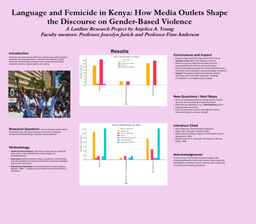Field Journal Week 4
While all Laidlaw Scholars will be presenting their research at the Columbia Undergraduate Research Symposium in the fall, what are the more immediate expectations that you have for your research? Are you writing a paper? Will your research be part of a larger scientific study? Do you hope to produce an annotated bibliography that you reflect on down the line? Is your research now the first phase of a project you’ll continue to work on throughout the year, and/or next summer? Now that we are nearing the one month mark of the program, please write about your expectations for your research. As I near the one-month mark of my Laidlaw research project, my immediate focus is on transcribing and analyzing qualitative interviews with journalists and media experts. These conversations explore key themes such as narrative framing, editorial independence, and the ethical dimensions of reporting on femicide in Kenya.
In addition to preparing for the Columbia Undergraduate Research Symposium in the fall, I aim to produce a blog post and a short video summary of my findings. These materials will be tailored to raise awareness about media framing and femicide, particularly among Kenyan youth and advocacy networks. I hope this project will serve as the first phase of a longer-term initiative, with the potential to grow into a broader campaign or research collaboration beyond the summer.
Why does your research matter? Explain the significance of the question you are investigating, and why you are interested in it. My research matters because the way femicide is framed in the media influences how society perceives, responds to, and ultimately acts on gender-based violence. In Kenya, where cases of femicide are rising, media narratives often risk decontextualizing these crimes, portraying them as isolated domestic disputes rather than symptoms of systemic gender inequality. By investigating how language, tone, and editorial choices shape public understanding of femicide, my project seeks to illuminate the role of journalism in either reinforcing or challenging harmful norms.
I am personally invested in this topic because I have witnessed how media representation can either empower or silence vulnerable groups. As a Kenyan writer and advocate for quality education and gender justice, I believe that transforming how stories are told is essential to transforming the structures that enable violence. This research is a step toward holding narratives accountable and building a more informed, empathetic, and justice-oriented media landscape.


Please sign in
If you are a registered user on Laidlaw Scholars Network, please sign in
Thank you for sharing, Anjelica! Looking at media is a very interesting and important way to combine both qualitative and quantitative aspects of your research in a way that is very effective. I have also been looking at narratives (albeit mythology, rather than reality), and I was wondering if your focus is on gathering the information and presenting data, or if you're looking to create an exemplar framework by which these stories can be transformed.